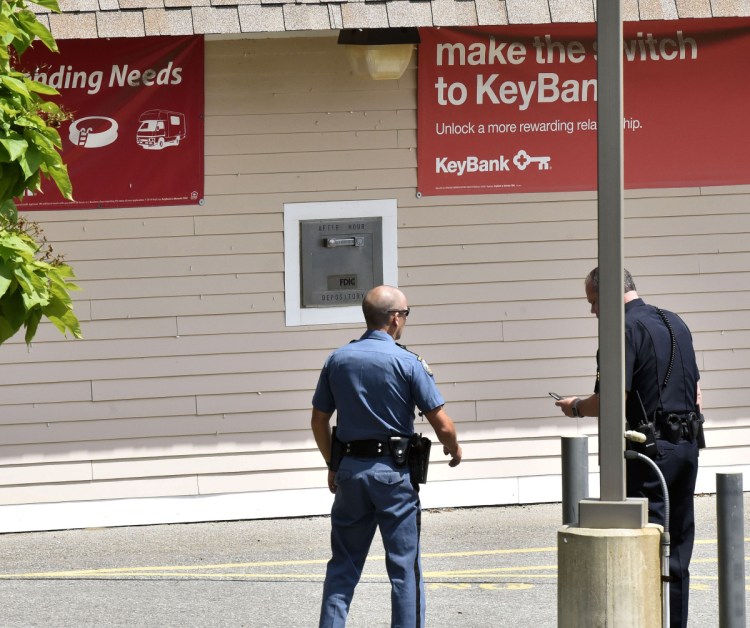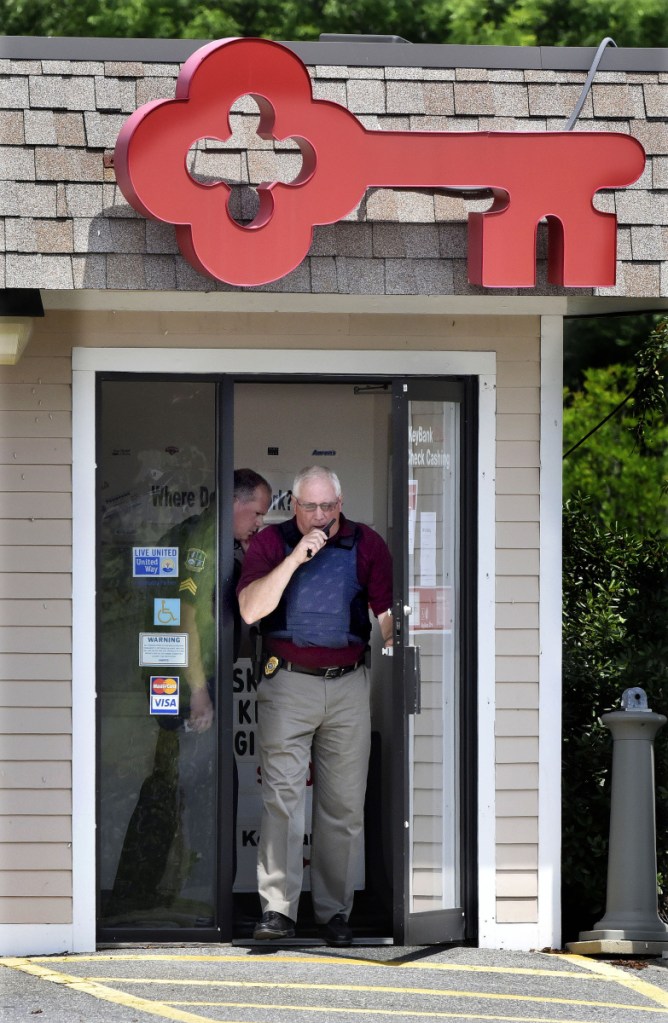AUGUSTA — The suspect in Tuesday’s Waterville KeyBank robbery told police he had been picking berries from the roadside when they found him lying on the ground about 20 feet from “a large amount of cash.”
That information was contained in an affidavit by Waterville Detective Damon Lefferts filed at the Capital Judicial Center in support of the robbery charge against Kevin Lee Barr.
But what led police to the spot where they arrested Barr was neither dog, nor human, nor drone. It was another species of high tech.
Waterville police Chief Joe Massey credits GPS tracking devices for the swift capture of Barr and hopes the technology will be a deterrent for others thinking about committing similar crimes.
“Once we received that call here — because we knew KeyBank used GPS trackers — we were able to pull up (that software) and start tracking the person that’s carrying the GPS receiver,” Massey said.
The information allowed the Waterville officers and other responding agencies to form a perimeter within minutes around the suspect so that they could contain him.
Dispatchers continued to update the officers every time the suspect moved and directed them to where he was moving.
“There was movement and then there were times that he actually stayed still; he stayed in one spot,” Massey said. “It was accurate enough that the dispatchers were able to tell us he’s approaching within 50 feet of Lincoln Street.”
Massey said dispatchers could tell police the address of the residence next to which Barr eventually hunkered down.
“When the dispatcher finally told us the last place that he was stationary, he was within 20 feet of that spot,” he said. “It was a good ending for us; bad for him, good for us.”
Barr, 38, of Waterville, is accused of robbing the KeyBank branch on Kennedy Memorial Drive on Tuesday morning.
The class B robbery charge carries a maximum penalty of 10 years in prison. The affidavit says that Barr committed the theft and threatened to use force against two tellers working at the time.
Standing in an orange jail uniform over a long-sleeved white shirt, Barr made an initial appearance Wednesday in court via video from the Kennebec County jail in Augusta.
Justice Donald Marden told him he was not called upon to plead at this point because the matter must be referred to a grand jury to consider, and in the meantime Barr would be held in jail or would be out on bail.
Waterville police began trailing the suspect almost as soon as the alarm came in because of the tracking devices that had been planted in the money. The arrest was made in woods near Lincoln Street at 11:37 a.m. — 40 to 45 minutes after the alarm was sounded.
The tellers told police that the robber was armed with a handgun and wearing a blue bandanna over his face as well as a black baseball cap when he entered the bank at 10:49 a.m. Lefferts’ affidavit says the robber fled on a bicycle holding the stolen money in his bare hand.
Lefferts reported that when the suspect was arrested, he was wearing only blue jeans and told officers he was going for a walk.
Lefferts said the suspect was identified as Barr and was the same person seen on KeyBank surveillance video.
“Also recovered in the woods via K-9 track were two tracking devices (which were hidden inside of the bills stolen from Key Bank) and the bicycle which was used in the robbery,” Lefferts wrote.
The GPS tracking receiver placed in the money bag by one of the tellers also has been used in pharmacy robberies to track the suspects, Massey said.
“I attribute that technology to the decrease in pharmacy robberies,” Massey said. “Just 10 years ago we were reaching epic numbers of pharmacy robberies, here in Maine and across the country. I think (the trackers) coupled with local, state and federal enforcement efforts on pharmacy robberies have really decreased them.”
The trackers, Massey said, are placed in pill bottles or money bags during a robbery and are small enough so that the suspect can’t detect them.
He said he’s not sure how many banks in the area use the trackers. “That’s a decision that each bank makes.”
He hopes this event will dissuade people from attempting to rob a bank.
“Some people have commented, ‘My God, why would the police say that they got this technology? Now the bad guy will know,'” he said. “Well, we want them to know. We want this as more of a deterrence.”
In this case it worked out that police were able to capture the suspect fairly easily, Massey said, but it doesn’t always work out that way.
“It’s nice to catch them, but you know what? I would rather not even have that scenario unfold, because there’s always a chance that someone gets hurt,” Massey said. “The more that we can ensure people who commit crimes such as bank robberies are probably going to get caught, the more we can deter them, and that’s the best-case scenario.”
Barr was represented by attorney Matthew Kanwit as lawyer of the day.
Barr said he had been represented by attorney David Geller in the past and requested the court appoint Geller on this case as well.
Assistant District Attorney Christopher Coleman said the state requested $20,000 cash bail on the charge with conditions that prohibit Barr from having dangerous weapons.
“Mr. Barr robbed KeyBank,” Coleman told Marden. “His weapon was shown in the video. We are still working to recover that.”
Coleman also said he anticipated additional charges would be coming soon.
Kanwit said he agreed with the bail and conditions, which were then imposed by Marden.
Barr is scheduled for a dispositional hearing in the case on Sept. 13.
While Barr said he did not want to talk to police when he was apprehended, Lefferts wrote, “Barr made an excited utterance that he was ‘picking berries by the roadside when the police arrested him.'”
At that point the GPS tracker had picked him as the likely suspect.
Betty Adams — 621-5631
Twitter: @betadams
Send questions/comments to the editors.






